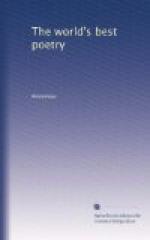She saw her brother Peterkin
Roll something large and round,
Which he beside the rivulet,
In playing there, had found;
He came to ask what he had found
That was so large and smooth and round.
Old Kaspar took it from the boy,
Who stood expectant by;
And then the old man shook his head,
And, with a natural sigh,—
“’Tis some poor fellow’s
skull,” said he,
“Who fell in the great victory.
“I find them in the garden,
For there’s many hereabout;
And often, when I go to plough,
The ploughshare turns them
out;
For many thousand men,” said he,
“Were slain in the great
victory.”
“Now tell us what ’twas all
about.”
Young Peterkin he cries;
And little Wilhelmine looks up
With wonder-waiting eyes,—
“Now tell us all about the war,
And what they fought each other for.”
“It was the English,” Kaspar
cried,
“Who put the French
to rout;
But what they fought each other for
I could not well make out;
But everybody said,” quoth he,
“That ’twas a famous victory.
“My father lived at Blenheim then,
Yon little stream hard by;
They burnt his dwelling to the ground,
And he was forced to fly;
So with his wife and child he fled,
Nor had he where to rest his head.
“With fire and sword the country
round
Was wasted far and wide;
And many a childing mother there,
And new-born baby died;
But things like that, you know, must be
At every famous victory.
“They say it was a shocking sight
After the field was won,—
For many thousand bodies here
Lay rotting in the sun;
But things like that, you know must be
After a famous victory.
“Great praise the Duke of Marlborough
won,
And our good Prince Eugene.”
“Why, ’twas a very wicked
thing!”
Said little Wilhelmine.
“Nay, nay, my little girl!”
quoth he,
“It was a famous victory.
“And everybody praised the duke
Who this great fight did win.”
“But what good came of it at last?”
Quoth little Peterkin.
“Why, that I cannot tell,”
said he;
“But ’twas a famous victory.”
ROBERT SOUTHEY.
* * * * *
AT GIBRALTAR.
I.
England, I stand on thy imperial ground
Not all a stranger; as thy
bugles blow,
I feel within my blood old
battles flow,—
The blood whose ancient founts are in
thee found
Still surging dark against the Christian
bound
While Islam presses; well
its peoples know
Thy heights that watch them
wandering below:
I think how Lucknow heard their gathering
sound.
I turn and meet the cruel, turbaned face.
England! ’tis sweet
to be so much thy son!
I feel the conqueror in my blood and race;
Last night Trafalgar awed
me, and to-day
Gibraltar wakened; hark, thy evening gun
Startles the desert over Africa.




